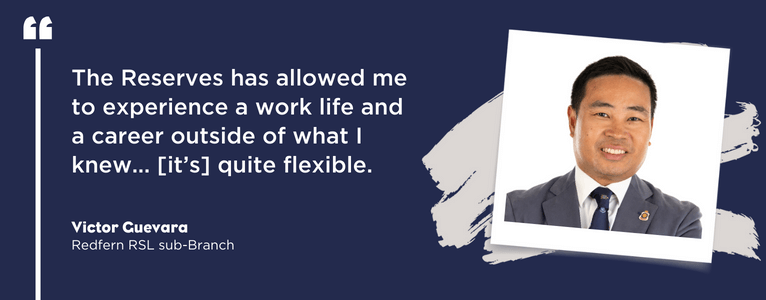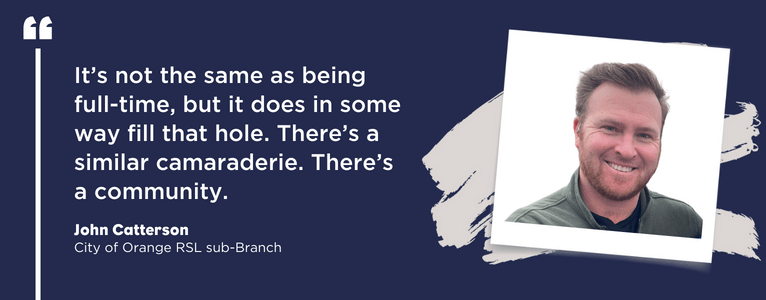Two RSL NSW members on life in the Reserves

Victor Guevara and John Catterson share their experiences serving in the Army Reserve, and the value of being a Reservist.
By Chris Sheedy
At a glance:
- Between the immersion and community of full-time service and the independence of civilian life are the Reserves.
- Joining the Reserves has allowed accountant Victor Guevara to keep a foot in the door of his civilian career.
- John Catterson says it’s a juggle and requires sacrifices, but the common culture and understanding among Reservists make it worthwhile.
- “I would now recommend that any person who has separated from the Regular Army should give the Reserves a try,” he says.
Many members of RSL NSW, whether they have served full-time in Defence or not, are also members of the Army Reserve.
But what is the value in being a Reservist, the satisfaction that keeps part-time servicepeople coming back year after year, and sometimes deploying for months at a time? To find out, we spoke with two RSL NSW members about their experiences in the Reserves.
Victor Guevara, Redfern RSL sub-Branch
Victor Guevara has served in the Army Reserve since 2007. He also works as the Chief Financial Officer for a US multinational pharma company.

“As others who have served would know, very often you meet people from different places, with different backgrounds and from different walks of life when you join the Army Reserve, which is very enriching and rewarding.
“You meet people from so many different careers, professional environments and stages of life, and there’s one thing that is almost universally common between them: they are all the most down-to-earth people I’ve ever met.
“I’m a Lieutenant Colonel in the Army Reserve, and the Chief Financial Officer of the Australia/New Zealand operations for a US multinational pharma company. For the Reserves, I generally do about 50 days a year.
“I’m a Royal Australian Army Pay Corps Officer, currently posted to the Adjutant General’s branch of Army Headquarters. Members of our corps provide the capability to deploy financial advisers on operations, and we help to provide financial advice and assistance with governance and risk for the Army.
“I joined the Reserves in 2007, after having been in the civilian workforce for five years. In my mid-20s, I was moved from an expat assignment in Singapore to a small factory in Gosford. I originally thought the business was trying to send me a message. They weren’t, and I had a great career with that business, but it made me want to experience other things.
“One day I found an accounting magazine in the lunchroom of the factory. Inside was a story about an accountant who had joined the Reserves. It was just what I was looking for. Sixteen years later, I’m still in the Reserves and have had numerous fantastic experiences.
“Five years ago, I received a phone call asking if I’d like to go to the Middle East for six months for Operation Accordion. My employer was very gracious and said yes. I was based at the main Australian logistics base in the Middle East. I was the financial adviser for Operation Accordion for six months, and it was a truly eye-opening experience which I shall never forget.
“The Reserves has allowed me to experience a work life and a career outside of what I knew, without actually leaving my civilian work life. I wanted to keep a foot in the door of my civilian career. But professionally, it has been rewarding in that the Reserves gives me an experience of what it is like to do things outside the corporate environment.
“It can be a juggle at times, depending on where you are in your civilian job, and the pressures of that job. But being in the Reserves is quite flexible.”
John Catterson, City of Orange RSL sub-Branch
John Catterson has served in both the Reserves and the Regular Army. He transitioned out of Defence in 2022.

“Joining the Army was something I became interested in during the last couple years of school. But I thought it would be a good idea to go to university first.
“So, I enlisted in the Sydney University Regiment in my first year of uni as a way of doing both, with a plan to go into the Regular Army once I finished.
“I’ve spent enough time in Defence to see a huge change in attitude towards the Reserves from the early 2000s. Full-time Army staff would sometimes be posted to a Reserve unit and it was seen as a post that was not preferred. They had a chip on their shoulder. It usually took those members 6–12 months before they started to get their head around the Reserves and how it works.
“There used to be a marked delineation between full-timers and Reservists, but now there seems to be much more integration. When I deployed to Iraq in 2007, a couple of the drivers attached to our platoon were Reservists. That was the first time I saw Reservists and the Regular Army working together so closely.
“I have seen this happening more over time; there has been a lot more integration into deployments. In recent years, we’ve seen some really good opportunities for Reservists to get deployments and do courses and get the same skills as full-time personnel.
“I think there’s now a lot more respect than there was. The attitude when I joined the Regular Army was very much that the Reserves don’t count, but I no longer see that attitude when we have full-time people come into the Reserves. There’s much better understanding between service types.
“I would now recommend that any person who has separated from the Regular Army should give the Reserves a try. It’s not the same as being full-time, but it does in some way fill that hole.
“There’s a similar camaraderie. There’s a community, and the big difference is that it’s for three hours on a Tuesday night, rather than every living moment. But there’s still a common language, common jobs, common culture and a common understanding.
“At the same time, it is a juggle. To have a life or a family is a juggle in the military either way. It can be tricky to have a full-time job and finish at 5pm on a Friday, be down at the unit at 7pm, work the whole weekend and be back in the office on Monday.
“But you’re bonding throughout that; the other people around you are in the same position. It’s not easy in the Reserves and it’s not easy in the Regular Army, but you make those sacrifices.”
A version of this article was published in the September issue of the Reveille magazine.
Whether you’ve served for a single day or decades, RSL NSW welcomes veterans of any service length and background to join the organisation. Access support services and become part of a like-minded community of peers by becoming a member of RSL NSW.






